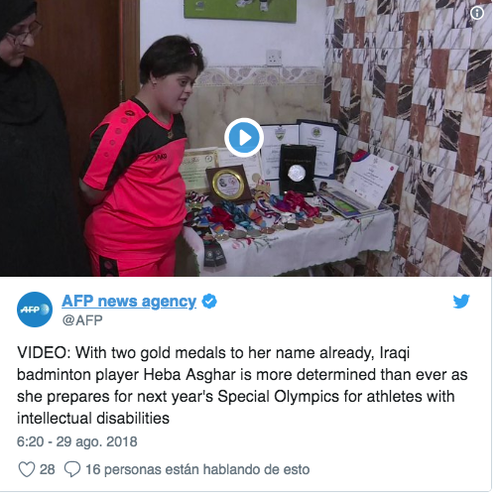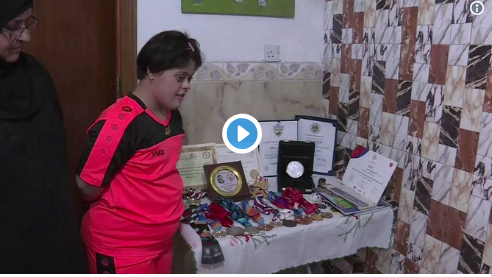
At 23, Heba Asghar, with Down syndrome, is an excellent badminton player with gold medals in Greece and the United States. In March he will again defend the colors of Iraq at the Special Olympic Games in Abu Dhabi.
What makes Heba especially special - a young coquette who has her hair tied with a pink ribbon - is that she was born with an extra chromosome, and lives with trisomy 21.
When she was small, "she was not stable, she was even aggressive with family members" recalls her mother Suad in the small house in a middle class neighborhood of Baghdad.
But at age 10 he made his debut in ping-pong and won a silver medal in Japan in special games, in which athletes face a mental handicap. Then Heba specialized in badminton. "He clung to it and overcame his handicap. She became a champion and that makes her feel proud "the mother congratulates herself. In 2015, his badminton gold medal at the Special Summer Games in Los Angeles earned him even a monthly pension of USD 600 from the Ministry of Youth and Sports.
Trophies and medals

While waiting for the next Special Games, scheduled for March 14-21, 2019 in Abu Dhabi, Heba Asghar impeccably aligns his trophies and medals, as well as press clippings and photos in which he appears, on a small table, while dreaming of "New medals".
Also Dhai Wadi, 17, is affected by the trisomy and is preparing for Abu Dhabi. In the last special Games - also organized by the Emirates in March 2018 - he shined in athletics, winning the gold in the 25 meters and the silver in the 50, surpassing rivals coming from 31 countries in total.
"When Dhai started three years ago, he was swimming, but finally he preferred the speed race," says his father, Ali Wadi, 60 years old. There is no data on the number of people affected by trisomy in Iraq, and "there are no medicines for them," laments the man. Despite this, Iraq returned from the last regional special games with 52 medals, especially in badminton, swimming, basketball, athletics and bocce, the Italian version of petanque.
"These athletes are willing to overcome their handicap" and since practicing a sport "they are more independent" explains to AFP Esam al Jafaji, director of a specialized sport school and subsidized with public funds.
This sexagenarian set up the "special" team of Iraq, whose motto is inscribed on all the walls of the gymnasium: "Let me win, and if I do not succeed, let me show my courage by trying." Ali, a young athlete from Baghdad, knows a lot about courage. After two operations of the heart, he obtained a gold medal in Bocce at the age of 24 in the last regional special Games. He hopes to reiterate success at the Abu Dhabi Special Games, which will gather 7,000 athletes from 177 nations, and compete in 24 disciplines.
Social wall
Champions or not, the "special" athletes - like other mentally handicapped in Iraq - hit a wall, says Heba's mother: that of the elusive or suspicious looks in the streets.
"There are people who help mentally disabled young people and support them, but unfortunately there are also people in Iraqi society who do not understand" their problems, affirms the woman.
According to recent studies, the majority of Iraqis refuse to enroll children affected by trisomy in public schools.
"Sometimes, when we go somewhere with Heba, people get away from her, as if they are afraid. And I ask myself, a little candidly: why do they do that? "Says his mother.
"Sometimes Heba cries, but I answer: you are better, you are a champion "
Its sad to see how nowadays there is still discrimination towards people who have the trisonomy 21, beyond the respect that we all deserve, these people deserve total admiration for standing out in different areas.
Source: AFP News Agency
Comments